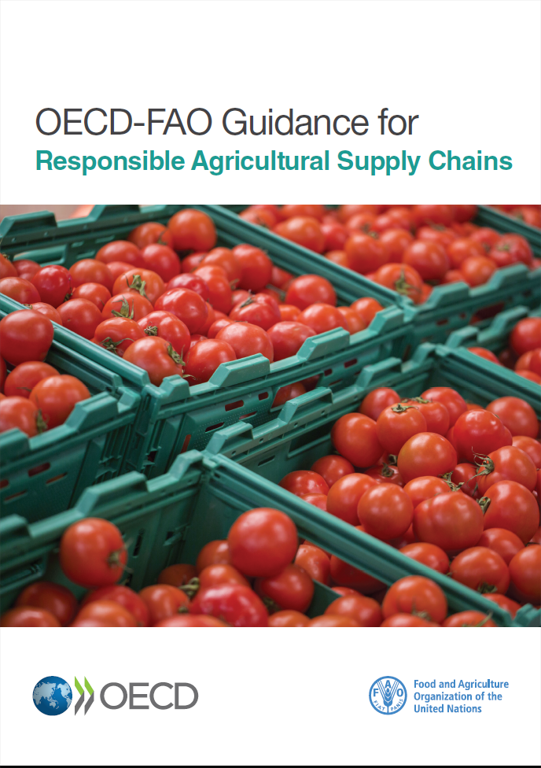OECD-FAO Guidance for Responsible Agricultural Supply Chains
The guidance has been developed by the OECD and the Food and Agriculture Organization of the United Nations (FAO) to help enterprises in applying standards of responsible business conduct along their agricultural supply chains to reduce adverse effects and contribute to sustainable development.
 In addition to their positive role, businesses involved in agriculture can also cause damage, such as expelling local people from their lands, employing children, abusing the vulnerable position of migrant workers and women and causing soil erosion, depletion of water resources or deforestation.
In addition to their positive role, businesses involved in agriculture can also cause damage, such as expelling local people from their lands, employing children, abusing the vulnerable position of migrant workers and women and causing soil erosion, depletion of water resources or deforestation.
Growing demand for food is attracting agricultural investment. Increasing participation of enterprises in agricultural supply chains may help to meet the growing demand for agricultural products, however it may also increase the risk of adverse effects, especially in countries with poor governance or precarious land ownership.
The OECD and the FAO, with the support of a broad range of stakeholders, have developed the guidance to help participants of agricultural supply chains in following the internationally recognized standards of responsible business conduct and to apply due diligence along their agricultural supply chains. Due diligence enables to mitigate adverse effects and benefits companies by reducing reputational, operational and financial risks.
Target group of the sector specific guidelines includes all enterprises operating along the agricultural supply chain, whether domestic or foreign, public or private, small, medium or large. It covers the entire product chain, from upstream supply to production, postharvest handling, processing, transportation, marketing, to distribution and retail. It also affects investment funds, sovereign wealth funds and banks. It provides support for governments and OECD National Contact Points to understand and promote standards in agricultural supply chains and to clarify legitimate expectations of the affected communities.
The document consists of four main parts:
- The first part is an example of a corporate policy model for responsible agricultural supply chain based on international standards;
- The second part presents the five-step approach of risk-based due diligence that allows enterprises to identify, assess, eliminate/mitigate the adverse effects associated with their activities and to be accountable for these taken steps;
- Annex A represents the main risks and their mitigation;
- Annex B deals with relations to indigenous peoples;
- The guidance builds on the OECD Guidelines and other internationally recognized standards, but does not replace them.
International documents considered the most important with regard to the guidance:
- the OECD Guidelines for Multinational Enterprises (the Guidelines),
- the Principles for Responsible Investment in Agricultural and Food Systems (CFS-RAI Principles),
- the Voluntary Guidelines on the Responsible Governance of Tenure of Land, Fisheries and Forest sin the Context of National Food Security (VGGT),
- the Principles for Responsible Agricultural Investment that Respects Rights, Livelihoods and Resources (PRAI).
In addition to the horizontal issues of responsible business conduct, (impact assessment, publicity/disclosure, consultation, benefit sharing, complaint handling mechanisms, gender equality), the document addresses the following risk areas:
- human rights
- labour rights,
- health and safety,
- food security and nutrition,
- property rights,
- animal welfare,
- management,
- natural resources,
- technology and innovation.
Five-step approach of risk-based due diligence:
- establish strong company management systems,
- identify and assess risks in the supply chain,
- design and implement a strategy to respond to identified risks,
- carry out independent third-party audit of supply chain due diligence,
- report annually on supply chain due diligence.
For further information, please visit:
http://mneguidelines.oecd.org/rbc-agriculture-supply-chains.htm
